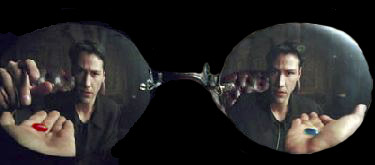For example: Ignatius of Antioch
"Let me be fodder for wild beasts--that is how I can get to God. I am God's wheat and I am being ground by the teeth of wild beasts to make a pure loaf for THE ONE . I would rather that you fawn on the beasts so that they may be my tomb and no scrap of my body be left. Thus, when I have fallen asleep, I shall be a burden to no one. Then I shall be a real disciple of THE ONE when the world sees my body no more."
A man truly unplugged from the Matrix
A man truly unplugged from the Matrix




Post a Comment
6 Comments:
I need to get into the saints you are always bringing up. I used to read saints biographies when I was a kid. In fact, they were my earliest reading memories.
See you in the AM.
Sounds like he was a bit, at least from this quote, “plugged in,” albeit maybe unwittingly, as a precursor of Christian Gnostic thought…hmmmmm…the world and body ain’t all bad blokes…they both have their origin from and in THE ONE.
Only geeks actually look up the reference.:) Don't forget I said neo-Gnostics were plugged in, notwithstanding ancient ones. Welcome Constantine. Another good (though somewhat confused) film with lots of powerful spiritual imagery.
I hope no umbrage was taken Padre Neo with my swipe at the St. Ignatius quote. I meant no dishonor to you or the old Martyr. Far be it from me (literally!) to cast any dispersion on the hagiography of the early Church. They at least earned their respect in large part. I have a dialectic streak, among other things, to be sure, and I hope it doesn’t rub the wrong way here. If it does I’m happy to yield. The deeper meaning behind my “assault” on the Saint’s quote goes to an observation I maintain. It occurs to me that whenever a convert finds conviction, whether it is labeled conservative, orthodox, or traditional, it often leads to a type of doctrinaire zealotry (with not much deference given to living the Sermon on the Mount). Many of those inside this “orthodox” box easily digress to a highly developed practice of self-denial, which in my book amounts to nothing short of Gnosticism. I find it ironic given the imperative of the “Golden Rule.” I think one can safely infer or extrapolate from the “Golden Rule” text that our words, actions, thoughts, and deeds concerning ourselves matter (please don’t take this an endorsement of the “health & wealth/prosperity” lunacy) because it extends to others! Our self image correlates to our image of others (and God!). That we might live our lives more fully counts—here and now. It seems to me that many who readily align themselves against anything heretical or heterodox (suspect notions given it depends on one’s definition), i.e. Gnosticism, often take up what they find so despicable—i.e. the desire to escape this world by the Left Behind whackos (a Gnostic idea to say the least among other things in my book). By way of another example more relevant though ancient, take a look at a, if not the, titan among the early Church Fathers--Origen (most Patristic scholars, even those who are often diametrically opposed to much of his thought, acknowledge his greatness as a theologian). He wasn’t condemned by his own because he chopped off his nuts to become a eunuch (seems fairly Gnostic to me), but because of one doctrine that he espoused. In other words, the problem the early Church had with Origen wasn’t his nutty (pun intended) behavior, but instead what they deemed an inflammatory dogma.
Constantine,
Pugnacious converts not withstanding, what do you mean by Gnosticism? I find in Ignatius' writings that 'matter matters' (especially when he refers to the Eucharist). Origen was definitely a dualist of sorts, what with the emasculation and all, but a Gnostic? I'm not sure about that.
Just because someone wants to dedicate his/her body to something doesn't mean they think it is evil in and of itself. Don't forget we live in a titillate the nerve-ending, rub your genitals against anything society. Earnestness about faith doesn't necessarily mean one is dualistic or Gnostic
You speak with authority Padre Neo. I like that. I would define Gnosticism as spiritual elitism, where the domain of the spirit is good and matter (interject here body, world, pleasure etc.) is bad. It is an obvious antithesis to the idea of the Theanthropos—the incarnation. Of course, this world has much to offer that is horrific, but in the end it is God’s world, even if scarred. The Gnostic notion of “secret knowledge” creeps up everywhere. While I would disassociate myself with much of the Gnostic ideals I’m sure there’s some good to be learned from it as well. I would just proceed with caution.
Post a Comment
<< Home